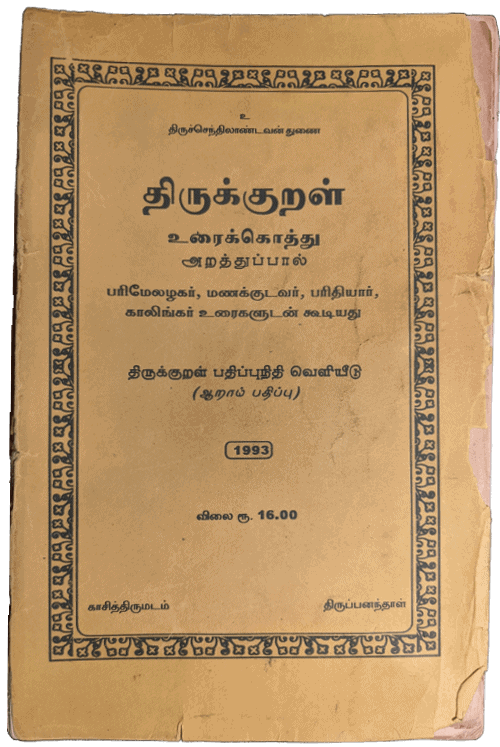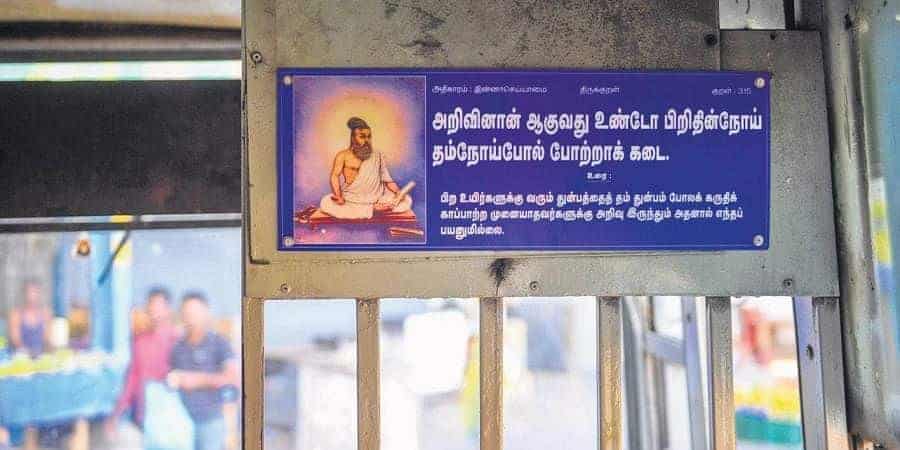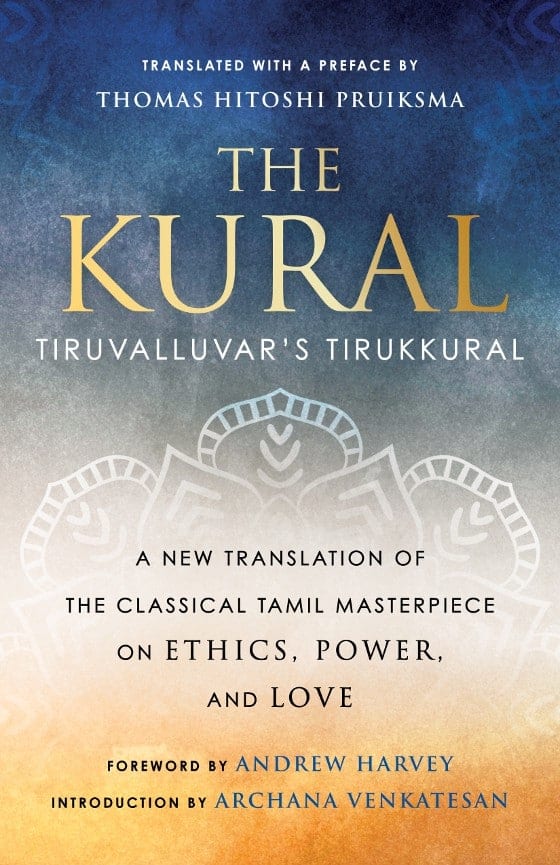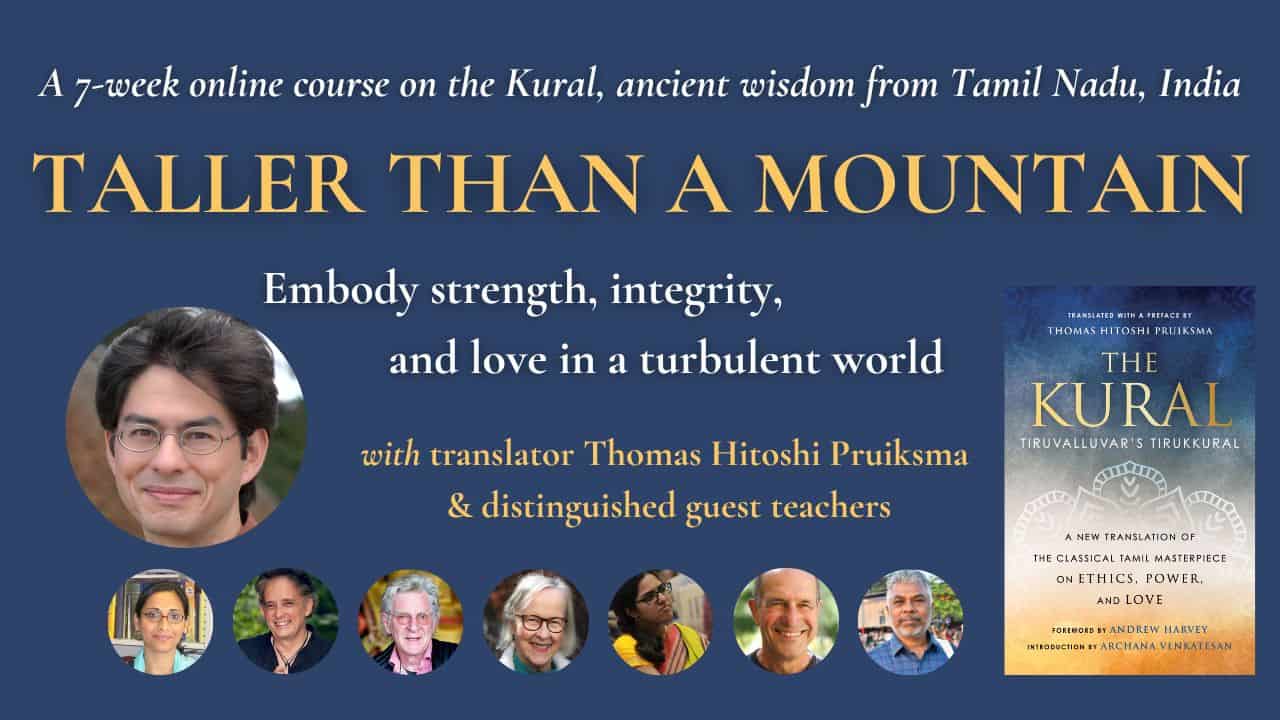A new translation of the classical Tamil masterpiece on ethics, power, and love.
I am humbled to have been able to translate Tiruvalluvar’s Tirukkural into English.
In the Tamil-speaking world, rooted in the state of Tamil Nadu in south India, this book is revered as a guide for how to practice compassion, goodness, and good sense in the nitty-gritty of daily life—from the life of the home, to the work of leaders, to the ways of love in our heart. Its great practicality, openness, and ecological wisdom make it astonishingly relevant to our time.
Yet this masterpiece of world literature, on par with the Tao Te Ching and the poetry of Rumi, has long lacked translations that make its guidance, vision, and playfulness available to readers in English.
And for years I never dared or even thought to make a translation.

THE KURAL, Part One: Virtue
How It Happened
In 2004, during a Fulbright year in India, I had a chance to study the book with my Tamil teacher, the late Dr. K. V. Ramakoti.
Each day we read and discussed one of the Tirukkural’s 133 chapters at length, exploring what each set of ten verses had to say on topics such as rain, hospitality, knowing the right time to do something, what it means to have power or to listen or to speak, and how not to be defeated by adversity. I also learned many of these verses by heart, wanting to know the book as well as I could.
Why? Because I’d recently rediscovered poetry as a source of both pleasure and insight (rather than the irrelevant puzzle it had seemed to me in school) and I wanted to experience why people in Tamil Nadu recognize this book as a treasure. I’d seen its verses at the front of countless city buses and heard even the most ordinary seeming people not only quote but delight in discussing their meanings.
Even more important, I wanted to see what these poems might teach me about what it means to live well in a time when the question of how we live is more important than ever.
In the years since that first in-depth exploration, whenever I spoke with Dr. Ramakoti on the phone or was able to visit him in India, he would often say, “Wouldn’t it be good if someone finally did a proper literary translation of the Tirukkural?” I would always agree, but it never crossed my mind that this someone could be me.

Verse 315 from THE KURAL at the front of a bus in Tamil Nadu
Till suddenly it did.
Starting on January 1, 2016, almost on a whim, I began translating one verse each morning. When I finished a handful of chapters, I called my Tamil teacher to tell him what I was doing.
“Oh, good,” he said, “you finally got it.” In every other area of life, he’d never hesitated to tell me what he thought I should or shouldn’t do, but because he was also a poet, I think he understood that he needed to wait until this particular task occurred to me naturally.
Now, after five years of work and the support of a National Endowment for the Arts Fellowship, I’m delighted to announce that the venerable Beacon Press published Tiruvalluvar’s Tirukkural on January 11, 2022.
“To translate even a single kural couplet, bewitching in its rhythm and packed with meaning, is a formidable task. But we now have Thomas Hitoshi Pruiksma’s translation, without doubt the best ever into English.”
—David Shulman, The New York Review
“In the astonishingly fresh and vibrant translations that adorn this book, Tiruvalluvar’s voice can now reach the universal audience that so deeply needs its universal wisdom.”
—Andrew Harvey, from the Foreword
“[An] exquisite translation . . . To live as the wise Kuṟaḷ advises us to—in a state of chronic, cultivated empathy and in service of others—is indeed to live right and to live well.”
—Archana Venkatesan, from the Introduction
“This translation provides a refreshing remembrance and illustration (without the usual reprimands and dire warnings) of how to be a good steward of the planet and what it means to live a good life—a much-needed map of astonishingly humane guidance and care.”
—Aimee Nezhukumatathil, author of World of Wonders
A Peek Inside
From the Cover
One of the masterpieces of world literature, Tiruvalluvar’s Tirukkural has been known in equal measure for the beauty of its poetry and for its practical philosophy: its discussions of ethics and the life well-lived. But the Kural has long been underserved by translators, who tend to sacrifice its poetry for what they see as its ideas. This new translation by Thomas Hitoshi Pruiksma draws on two decades of study under the Tamil scholar Dr. K. V. Ramakoti to bring English readers closer than ever to the brilliant inner and outer music of the original.
Likely composed between the 3rd and 5th centuries CE, each chapter of the Kural consists of ten short verses, or kurals, on a single theme, arranged in turn into three main sections: ethics at home, wealth in the world, and love in its many complexities. Together they encompass a vast range of personal and cosmic experience stretching from politics to hospitality, friendship, and greed. Tiruvalluvar’s text illuminates a vision of goodness that is as worldly as it is spiritual, and as broad as it is detailed and nuanced.
Accompanying the translation is a foreword by the founder of the Institute for Sacred Activism, Andrew Harvey; an introduction by the translator and scholar Archana Venkatesan; and a “Commentary of Notes,” in which Pruiksma elucidates key words and shares insights from important Tamil commentaries.
Preview
Publisher: Beacon Press
ISBN: 978-080700361-9 (Cloth)
Publication Date: January 11, 2022
Price: US $24.95
A Publication-Day Conversation with Archana Venkatesan
For the book launch of the Kural on January 11, 2022, the Elliott Bay Book Company and Tasveer hosted an online conversation between me and Archana Venkatesan, who wrote the marvelous introduction to the book. You can watch a complete recording below!
Interview with Andrew Harvey
Andrew Harvey, who wrote the splendid foreword to the Kural, interviewed me about this masterpiece of the Tamil language, exploring the work’s profound relevance for the present. Take a peek and a listen below!
A Note on My Approach
For those who may be interested, you can read about my approach to translating the Kural in this excerpt from my preface to the book.
Speaker Requests
I am delighted to speak about this seminal work to and with audiences of all kinds. If you are interested in having me present, please submit a speaker request. I’ll get back to you as soon as I can!

